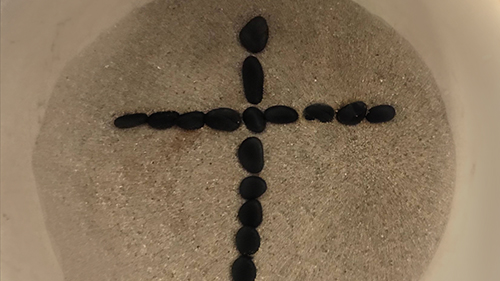Dear Friends,
The First Sunday of Lent each year has us with Jesus in the desert being tempted by Satan. The version we hear this year from Mark is quite short and does not go into the details of Satan’s clever three-part temptations and how Jesus responded to each. It simply tells us it happened. It also tells us that he was in the midst of wild beasts, but angels ministered to him.
Does it ever strike you when you are reading the Genesis story of Adam and Eve that sin seems to be inevitable? How could Eve and Adam not eat the fruit? Does the whole story not seem to funnel towards the Fall? Sin is inevitable. Sin had to happen. And yet, God does not decree what is inevitable. God did not create the world of necessity, but freely. How does this happen? How is it that sin seems inevitable? Why does it seem inevitable in my life? Why do I always seem to confess the same sins every time I go to confession?
St. Augustine tries to help us understand this problem by teaching, “The truth is that one should not try to find an efficient cause for a wrong choice.” Augustine writes, “It is not a matter of efficiency, but of deficiency; the evil will itself is not effective but defective.” Put another way, sin does not come from somewhere, but nowhere. Sin is sin precisely because it comes from nowhere. Adam did not sin for any reason; rather, sinis sinbecause it happens for no reason.
Theologians have long discussed the problem of evil coming into our world and have looked for the cause of Adam and Eve’s sin. The reality is that it remains shrouded in mystery. Perhaps all we can do in the final analysis is to recognize the reality of our sin and our responsibility for it. Though we cannot explain it, certainly we know enough to confess it.
Satan knows our weakness and attacks us in our weakness. He knows the sin we fall to daily. The Devil comes to us and says, “I know you. I know what you always do. You know it, too. Let’s get it over with. There is no use struggling against it. Your sin is inevitable. You will now fall to ________ as you have always done. It is what you are.”
We awake from our sin with a profound feeling of impotence, remorse, and shame. We feel remorse for the sin itself and impotence for the fact we are powerless against it. We feel helpless, for in remorse we have sworn to ourselves, “I will never do that again. When I feel tempted to this sin, I need to remember this moment, where I feel utter and profound degradation. In the future, I must recall this…It is not worth it.” And yet, only days later, when facing the same temptation, we fall again.
I remind people in almost every confession that the only real solution to dealing with our sinful ways is to turn to Jesus and rely on God’s grace to get us through. As Pope Benedict said shortly before his retirement:
“The human person is never wholly free from temptation…but with patience and true humility we become stronger than any enemy. The patience and humility required to defeat the enemy come by following Christ every day and from learning to build our life not outside of him or as if he did not exist, but in him and with him, because he is the source of true life. In contrast to this is the temptation to remove God, to order our lives and the world on our own, relying solely on our own abilities. This is why in Jesus God speaks to man in an unexpected way, with a unique and concrete closeness, full of love, because God has now become incarnate and enters the world of man to take sin upon himself, to overcome evil and bring man back into the world of God.”
I suggest you try surrendering to Jesus this Lent. When you feel yourself tempted to envy, anger, lust, greed, gluttony, laziness, or impatience turn to Jesus and invite him into your heart. Ask Jesus to set the temptation aside. Once Jesus has responded you will feel your heart set free. Free to truly be the person God created you to be and free to truly love.
Peace,
Fr. Damian



